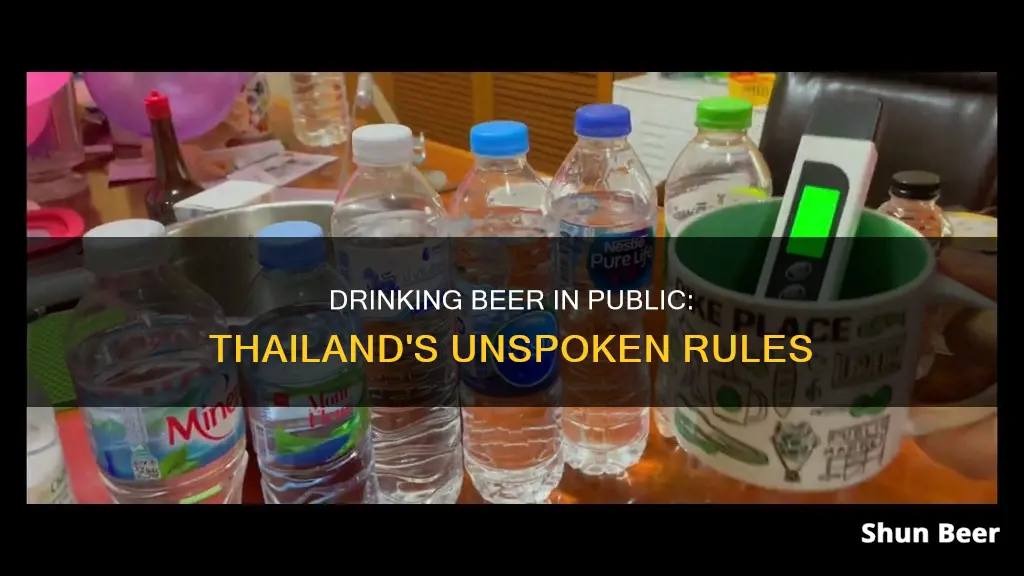
Thailand's drinking culture is quite different from that of other countries. While Thai people enjoy drinking and it is an integral part of socialising, there are some important rules and cultural norms to be aware of. Drinking in public is generally prohibited in Thailand, and doing so can result in a fine. However, in some places, it is allowed, and in tourist hubs and islands, it is more accepted. Alcohol is readily available and relatively inexpensive, but there are strict rules about when and where it can be purchased.
What You'll Learn

Drinking in public is prohibited in Thailand, but it is often tolerated by authorities
Thailand has strict laws regarding the sale and consumption of alcohol, but drinking in public is generally tolerated by authorities, although it is prohibited.
The legal drinking age in Thailand is 20 years, and the legal hours for purchasing alcohol are 11:00–14:00 and 17:00–24:00. These laws are enforced by fines for retailers, although some local shops may still sell during the ban. Alcohol sales are prohibited during elections and on Buddhist holidays, with a complete ban on sales and service on these days.
Drinking in public places, including streets, parks, and temples, is prohibited in Thailand. However, in practice, drinking on the street is often tolerated by authorities, especially in tourist hubs and islands. It is important to note that drinking in prohibited areas can result in a fine.
While drinking in public is technically against the law, Thailand's drinking culture is lighthearted and social, with alcohol being a common way to relax and enjoy time with others. Thais often share drinks and eat while drinking, and it is customary to ensure no one's glass is empty. Communal drinking is preferred, with groups often ordering a bottle of spirits to share, allowing each person to control the potency of their drink.
When drinking in Thailand, it is important to be mindful of cultural norms and to avoid causing a loss of face. While drinking is a common social activity, it is considered unacceptable to become extremely intoxicated, act disorderly, or engage in behaviour that may be seen as losing face.
Drinking Beer in Dishonored: What's the Deal?
You may want to see also

You can be fined for drinking in public
Drinking in public is generally prohibited in Thailand. While drinking on the street is often tolerated by the authorities, it is against the law and you can be fined for it.
According to Thai law, you shouldn't drink alcohol at or within the following places:
- Temples or places of worship (unless drinking is a part of worship)
- State public health service units
- Public offices (except areas designated for living or for the establishment of a shop or club)
- Dormitories
- Educational institutions
- Petrol stations or shops within a petrol station
- Public parks
- Other places notified by the Minister with the approval of the Committee
Violators of this restriction are liable to a fine of up to 10,000 THB or imprisonment for up to six months. You will usually see signs in places where drinking is prohibited.
It's also worth noting that drinking is not allowed in public parks or places of worship and temples. However, there may be ceremonies at temples where drinking is allowed.
While drinking on the street is sometimes restricted, it is not illegal to drink in many places. You will see signs indicating where drinking is restricted, such as in parks.
Additionally, it is illegal to sell or drink alcohol on certain religious days and during elections. Alcohol sales are prohibited during these times, and only a few bars and restaurants will serve alcohol.
Beer and Warfarin: Safe Mix or Health Risk?
You may want to see also

Drinking alcohol in temples or places of worship is forbidden
Drinking in public is generally prohibited in Thailand, although it is often tolerated by authorities. However, drinking in public parks, temples, and places of worship is forbidden. There may be exceptions during certain ceremonies or festivals, but generally, alcohol consumption is not permitted in these locations.
Thailand has a unique drinking culture, and it is considered impolite to walk down the street drinking a bottle of beer. While drinking on the street is not always illegal, it is socially frowned upon, especially in cities like Bangkok. However, in tourist hubs and islands, drinking in public may be more accepted.
If you do choose to drink in public, be mindful of the cultural norms and customs. Thai people value respect and losing face is considered unacceptable. Drinking in public can be seen as disrespectful and may lead to negative perceptions. Additionally, drinking in public can result in fines, and it is important to be aware of the legal consequences.
It is worth noting that Thailand has strict laws regarding alcohol sales. Alcohol cannot be purchased in shops between midnight and 11 am, and between 2 pm and 5 pm. These restrictions do not apply to bars, restaurants, and clubs, where drinking is permitted during those hours. However, it is prohibited to drink outside or in public places, and it is important to respect the cultural and religious sensitivities of the country.
Beer and Diarrhea: Should You Drink or Ditch?
You may want to see also

The legal drinking age in Thailand is 20
Drinking in Thailand comes with a unique set of rules and cultural expectations. While the legal drinking age in Thailand is 20, there are several other considerations to keep in mind to drink responsibly and respectfully.
Firstly, it's important to note that drinking laws are not always strictly enforced, and underage drinking does occur. However, the police can take action against both individuals drinking underage and establishments serving them. While ID checks are rare, particularly in bars and supermarkets, almost every club will check IDs, so it's essential to carry identification when going out.
In Thailand, drinking in public places, such as parks and temples, is prohibited. Drinking on the street is also generally not allowed, although it may be tolerated in certain areas, especially in islands and tourist hubs. It's important to be mindful of social norms and avoid drinking in public, especially in Bangkok, as it is not socially acceptable and may be frowned upon by locals.
When drinking in Thailand, it's essential to follow local customs and behave respectfully. Thai culture values self-control and maintaining dignity, so it's important to avoid getting excessively drunk and losing face. Thais often share drinks and food, and drinking sessions can go late into the night. It's common for groups to order a bottle of spirits to share, along with a bucket of ice and mixers.
Another important consideration is the occasional ban on alcohol sales during certain times. Alcohol sales are prohibited during Buddhist holidays, the day before and during elections, and on specific public holidays like the King's Birthday. During these times, bars and clubs are closed, and restaurants do not sell alcoholic drinks.
Lastly, drinking and driving is illegal in Thailand, and the country has strict laws and penalties for drunk driving, including heavy fines, license suspension, and even imprisonment.
In summary, while the legal drinking age in Thailand is 20, it's crucial to follow local laws, respect cultural norms, and drink responsibly to ensure a safe and enjoyable experience.
Old Beer: Is It Safe to Drink After Years?
You may want to see also

Alcohol sales are banned on Buddhist holidays and during elections
Drinking in Thailand is a common way to socialise and bond with friends, family, and colleagues. However, there are specific rules and restrictions on alcohol sales and consumption that you should be aware of.
Firstly, it is prohibited to drink in public spaces, including on the street and in parks and temples. While drinking on the street is sometimes tolerated, it is against the law and can result in fines.
Secondly, alcohol sales are banned on Buddhist holidays and during elections. These bans are implemented nationwide and apply to all vendors, including bars, clubs, and restaurants. The sale of alcohol is prohibited for 24 hours during these periods, and vendors caught breaking the ban face legal consequences, including fines and imprisonment.
The Buddhist holidays on which alcohol sales are banned include Makha Bucha, Visakha Bucha, Asahna Bucha, Wan Khao Phansa, and Awk Phansa. These holidays are determined by the lunar calendar, so the exact dates vary each year. During these holidays, citizens engage in various religious practices and merit-making activities, and alcohol sales are prohibited to respect these observances.
In addition to the Buddhist holidays, alcohol sales are also banned during provincial and national elections. This includes local elections, and the ban applies to all vendors across Thailand.
It is important to note that alcohol sales at international airports and duty-free shops are sometimes exempt from these bans. Additionally, some smaller independent shops may unlawfully sell alcohol during these periods, but larger chain stores like 7-Eleven will always comply with the restrictions.
Therefore, if you plan to consume alcohol in Thailand, it is essential to be aware of these restrictions and plan accordingly. Respecting the local culture and customs is crucial to ensure a positive experience during your time in the country.
Krusteaz Buttermilk: The Perfect Beer Batter Base?
You may want to see also
Frequently asked questions
Drinking in public in Thailand is generally prohibited, and you can be fined for doing so. However, it is often tolerated by authorities, especially in islands and tourist hubs.
Drinking in public is prohibited in temples, public parks, government agencies, schools, fuel stations, and other designated areas.
Alcohol sales and consumption are banned during Buddhist holidays, elections, and certain public holidays.







